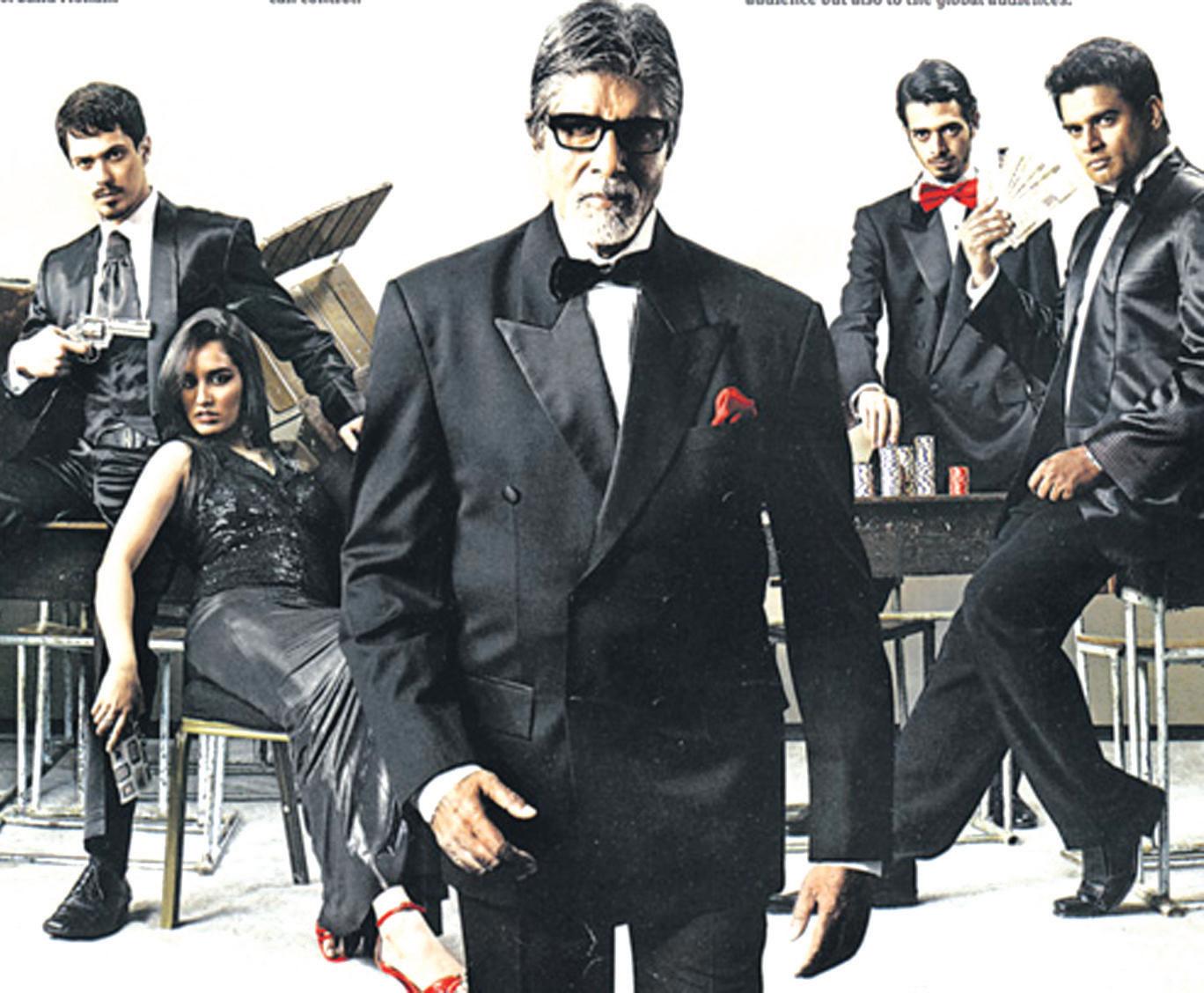
5 minute read
A romantic homage to Mumbai
from 2010-03 Melbourne
by Indian Link
Film: Thanks Maa
Cast: Shams Patel, Amit Saxena, Ranjit Barot, Alok Nath, Raghuvir Yadav, Yateen Karyekar and Sanjay Mishra
Director: Irfan Kamal
He’s 12, homeless and he refuses to adopt the swaggering amorality of his friends on the street. They call him Municipal Ghatkopar because that’s the address where he was dumped as a child. But he prefers to be known as Salman Khan.
Strongly reminiscent of Mira Nair’s Salaam Bombay and far more resonantly representative of Mumbai’s slum kids than Slumdog Millionaire, Thanks Maa is a journey into lives that were born into despair.
Without the crutches of self-pity, debutant director
Irfan Kamal enters the world of the orphaned protagonist
Municipality who on one of those routine days of scavenging, stealing and hanging around with his friends waiting for the next meal, comes across an abandoned little infant.
Before we can say ‘Hey Baby’, the narration quickly swerves away from the cute and schmaltzy aspect of findbaby-will-coochie-coo kind of feel-good cinema to show the gritty harsh reality of life on the relentless streets of Mumbai and how it toughens the tender ones. Real fast.
Irfan Kamal makes one helluva departure from convention. He cruises the crowded areas of Mumbai with an eye for stinging details. The film hints hectically at the savagely insensitive quality of life lived on the streets.
Our young hero refuses to be like the routine scum. “Main tere jaisa nahin hoon,” he tells his more street-wise pals, and sets off on a determined path to find the lost baby’s mother. It’s a heartbreaking enlightening journey undertaken by the director in a spirit of adventure, discovery and tranquility. Teeming with characters, Thanks Maa still preserves a core of stirring stillness at its centre.
Often you feel Thanks Maa is a romantic homage to the unbreakable spirit of Mumbai. But then you see the bitter and brutal truth about life on the fringes, as the young brave little hero is almost molested by the warden of the reformatory played by Alok Nath.
Thanks Maa is a tender yet ruthless look at a city that claims to have a place for everyone but somehow neglects looking after children who are vulnerable to every form of attack on the streets.
Quite frequently we look at Mumbai through the eyes of the little boy and his companions as they encounter a gallery of weirdos and wackos...an alcoholic hospital attendant (Raghuvir Yadav), a doped-out cabbie (Sanjay Mishra), a paedophilic reformatory warden (Alok Nath), a cheesy incestuous upper class father (Yateen Karyekar), an imposing eunuch (Jalees Shrawani) who offers to take the baby out of Municipality’s shoulder... an offer the boy firmly refuses.
The young hero’s shock and dismay when he finally finds the baby’s mother are so palpable they reverberate in our hearts long after the film is over.
The film has its flaws, the most glaring being the constant struggle to keep the homeless children’s story credibly contoured on the bustling streets. In many sequences, the young actor Shams can be seen carrying a doll instead of a baby. Also, because of the inherently dramatic nature of the theme some of the characters and situations lose selfcontrol.
The jagged edges do not undermine the film’s unique and thoroughly unorthodox blend of realism and social message. While the veterans pitch in brave cameos that take the narrative forward to its heartbreaking conclusion, it’s the child actors who proudly occupy centrestage. All of them are so in-character, you wonder which came first, the slums or the camera!
Some of the editing (Amit Saxena) is uneven. But the camerawork (Ajayan Vincent) and background score (Ranjit Barot) add an extra dimension to this heartwarming tale of an orphan who won’t let another newly-born suffer his fate.
Maths audaciously meets gambling
Film: Teen Patti
Cast: Amitabh Bachchan, Ben Kingsley, R. Madhavan, Raima Sen, Sarah Mohan, Mita Vashist Director: Leena Yadav

If you can get over the ludicrousness of a distinguished mathematician, whose god is Albert Einstein and who at the end of the film gets the ‘Isaac Newton Award’ for excellence in his field, masquerading as a seedy gambler, then Teen Patti is a surprisingly skilful and audaciously complex piece of drama.
It is a tautly-scripted and brilliantly executed film on the deep-rooted link between financial ambitions and moral compromises.
Writer-director Leena Yadav gives the theme of monetary indulgence a dizzying but pinned-down spin. She speeds confidently across out-of-control lives on a college campus with the confident vision of raconteur who spins a seemingly indecipherable web of deceit, intrigue and crime.
Miraculously, Yadav’s yarn preserves its pencil-sharp edge of intrigue and wit right to the end. The story of the eccentric math-magician’s adventures takes the narrative from underground addas to highclass casinos where Professor
Venkat Subramaniam, his junior colleague Madhavan and four students convert the professor’s newly-discovered mathematical theory into hard cash on gambling tables. The plot reveals layer after layer of conspiracy until we come to the core idea.
The story unravels through an extended dialogue in Cambridge between Subramaniam and a British maths professor Perci Trachtenberg played by Bachchan and Sir Ben. Just watching the two distinguished baritones exchange notes on academia, life and their overlapping quirks is a pleasure that makes for full paisa-vasool viewing.
Alas, one of the baritones belonging to Ben Kingsley speaks in Boman Irani’s voice. And that too in Hindi! Why are the two professors huddled together in Cambridge speaking to each other in a language that suggests no tenability except a practical desire to make itself intelligible to Hind-speaking Indian?
Teen Patti targets its cerebral entertainment quotient at an audience that is willing to expand, and not suspend its disbelief. The proceedings charted by the intricate plot take the characters belonging to three generations through a smoky, compromised kingdom of the devil and the damned.
There’s a touch of Faustian wickedness in the way the old professor, his subordinate colleague and their four brightest students embrace hedonism. The parameters of what ‘is’ and what ‘should be’ are almost blurred beyond redemption.
The film gets its moral colour and texture from the technicians who seem to know the exact shades needed.
The death of one of the students (debutant Siddharth Kher) signals the redemptive overture in the plot.
Siddharth’s ‘Bonnie & Clyde’ act with his girlfriend (Shradha Kapoor) is indicative of the places that youngsters want to visit in their fantasies. The nightmare is just a hop away from the dream.
From the mathematical and magical to the murky and immoral, Leena Yadav exercises supreme control over the goings-on. At any given moment the narrative is susceptible to collapse like a house of cards. But Yadav shows a grip over her characters’ dithering conscience.
Aseem Bajaj’s camera work is exquisite in delicate shades.
The camera knows where it has to go and slips in quietly to capture a world that has lost its plot.
The songs and dances are edited with an eye for elegant economy. This director means business. Many sequences such as the one where Madhavan says goodbye to his screen girlfriend Raima Sen are shot to suggest the edginess of a world that could topple over anytime.
Presiding over this world of infinite infamy is Bachchan. He portrays the ill-understood proclivities of the academic genius with a profound absence of brouhaha. Even as the world outside falls apart, Bachchan creates an unspoilt inner world for his character.
As for Sir Ben, the British actor’s clipped tone is gone. What remains is half a performance... Good enough.
Madhavan pitches in a bravura act with lots of furtive, nervous close-ups indicating a moral breach that could destroy the character any moment. The four newcomers are pleasant enough in the spaces provided for them. But given how well each of their character is written, none of them goes beyond the script’s requirements.
A pity. Because the film quite often transcends the written word to go into the realm of the abstract where the existential joys of mathematics meet more earthly pleasures. Surprisingly ingenious, Teen Patti is not so much about the cards that are dealt on the table as the ones that destiny doles
Subhash K Jha, IANS










